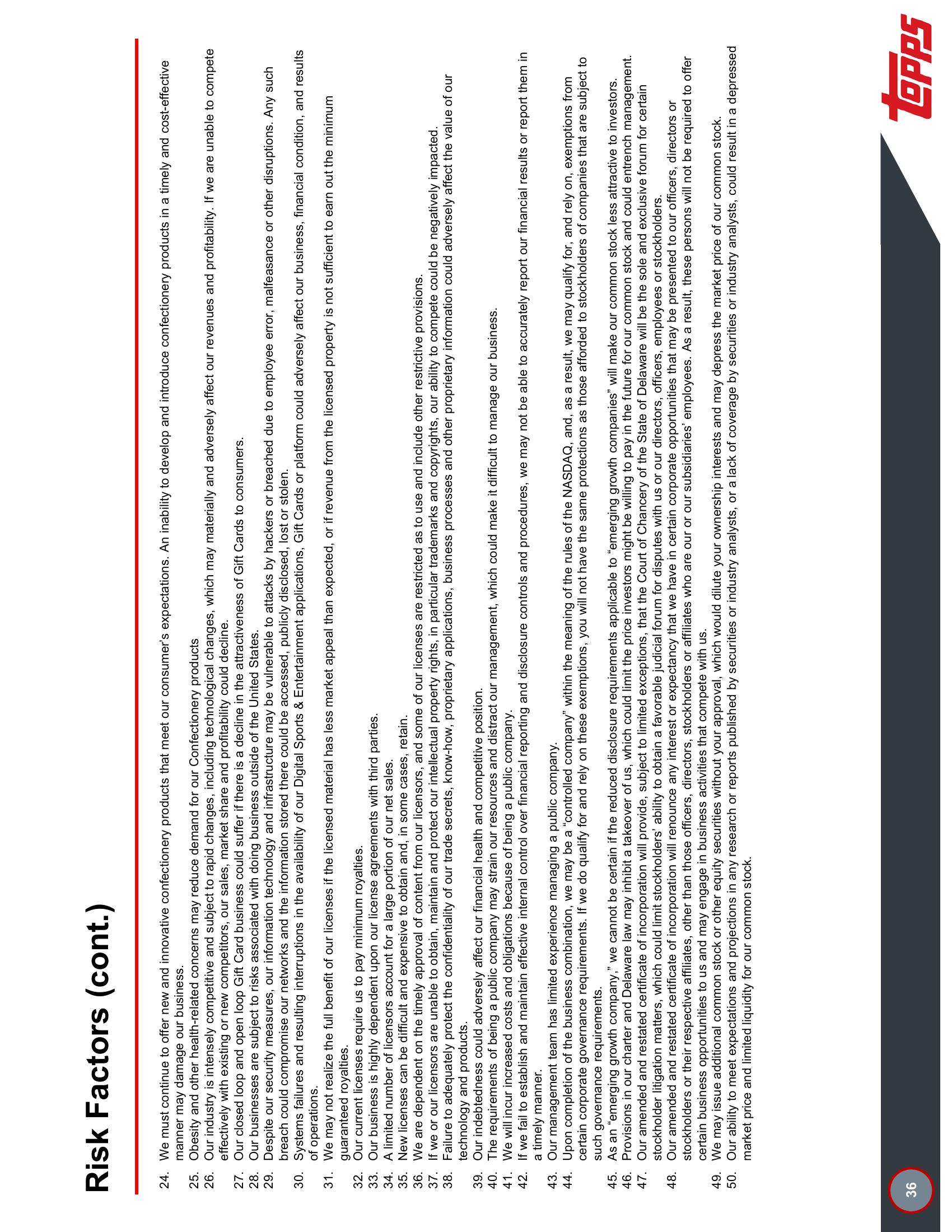Topps SPAC Presentation Deck
Risk Factors (cont.)
24. We must continue to offer new and innovative confectionery products that meet our consumer's expectations. An inability to develop and introduce confectionery products in a timely and cost-effective
manner may damage our business.
25. Obesity and other health-related concerns may reduce demand for our Confectionery products
26. Our industry is intensely competitive and subject to rapid changes, including technological changes, which may materially and adversely affect our revenues and profitability. If we are unable to compete
effectively with existing or new competitors, our sales, market share and profitability could decline.
27. Our closed loop and open loop Gift Card business could suffer if there is a decline in the attractiveness of Gift Cards to consumers.
28. Our businesses are subject to risks associated with doing business outside of the United States.
29. Despite our security measures, our information technology and infrastructure may be vulnerable to attacks by hackers or breached due to employee error, malfeasance or other disruptions. Any such
breach could compromise our networks and the information stored there could be accessed, publicly disclosed, lost or stolen.
30. Systems failures and resulting interruptions in the availability of our Digital Sports & Entertainment applications, Gift Cards or platform could adversely affect our business, financial condition, and results
of operations.
31. We may not realize the full benefit of our licenses if the licensed material has less market appeal than expected, or if revenue from the licensed property is not sufficient to earn out the minimum
guaranteed royalties.
32. Our current licenses require us to pay minimum royalties.
33. Our business is highly dependent upon our license agreements with third parties.
34. A limited number of licensors account for a large portion of our net sales.
35. New licenses can be difficult and expensive to obtain and, in some cases, retain.
36. We are dependent on the timely approval of content from our licensors, and some of our licenses are restricted as to use and include other restrictive provisions.
37. If we or our licensors are unable to obtain, maintain and protect our intellectual property rights, in particular trademarks and copyrights, our ability to compete could be negatively impacted.
38. Failure to adequately protect the confidentiality of our trade secrets, know-how, proprietary applications, business processes and other proprietary information could adversely affect the value of our
technology and products.
39. Our indebtedness could adversely affect our financial health and competitive position.
40. The requirements of being a public company may strain our resources and distract our management, which could make it difficult to manage our business.
41. We will incur increased costs and obligations because of being a public company.
42. If we fail to establish and maintain effective internal control over financial reporting and disclosure controls and procedures, we may not be able to accurately report our financial results or report them in
a timely manner.
43. Our management team has limited experience managing a public company.
44. Upon completion of the business combination, we may be a "controlled company" within the meaning of the rules of the NASDAQ, and, as a result, we may qualify for, and rely on, exemptions from
certain corporate governance requirements. If we do qualify for and rely on these exemptions, you will not have the same protections as those afforded to stockholders of companies that are subject to
such governance requirements.
45. As an "emerging growth company," we cannot be certain if the reduced disclosure requirements applicable to "emerging growth companies" will make our common stock less attractive to investors.
46. Provisions in our charter and Delaware law may inhibit a takeover of us, which could limit the price investors might be willing to pay in the future for our common stock and could entrench management.
47. Our amended and restated certificate of incorporation will provide, subject to limited exceptions, that the Court of Chancery of the State of Delaware will be the sole and exclusive forum for certain
stockholder litigation matters, which could limit stockholders' ability to obtain a favorable judicial forum for disputes with us or our directors, officers, employees or stockholders.
48. Our amended and restated certificate of incorporation will renounce any interest or expectancy that we have in certain corporate opportunities that may be presented to our officers, directors or
stockholders or their respective affiliates, other than those officers, directors, stockholders or affiliates who are our or our subsidiaries' employees. As a result, these persons will not be required to offer
certain business opportunities to us and may engage in business activities that compete with us.
49. We may issue additional common stock or other equity securities without your approval, which would dilute your ownership interests and may depress the market price of our common stock.
50. Our ability to meet expectations and projections in any research or reports published by securities or industry analysts, or a lack of coverage by securities or industry analysts, could result in a depressed
market price and limited liquidity for our common stock.
36
LOPPSView entire presentation